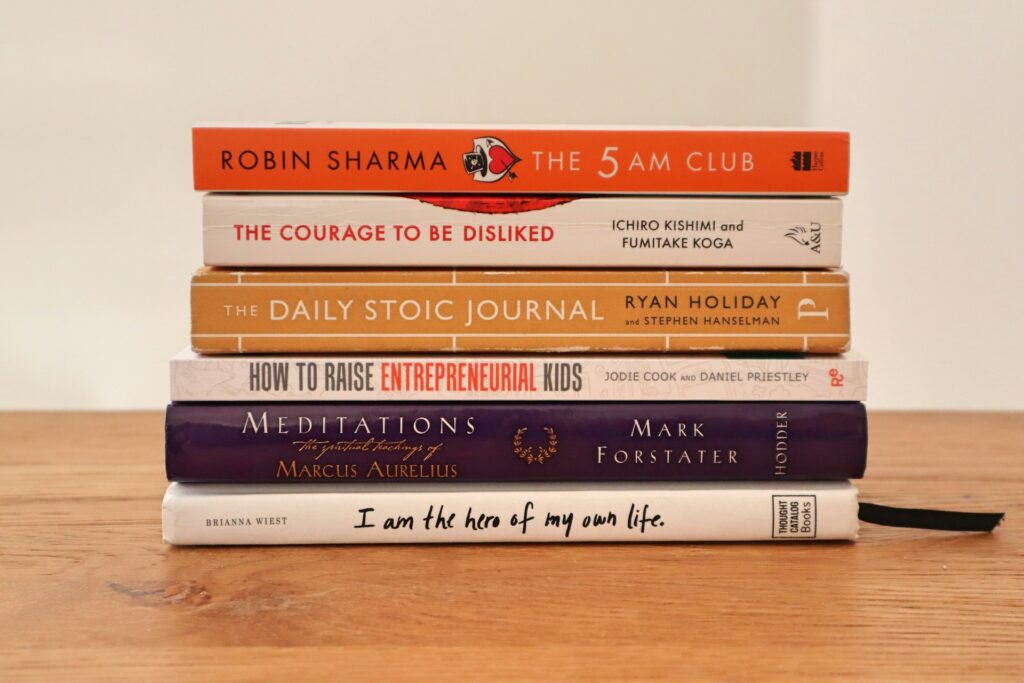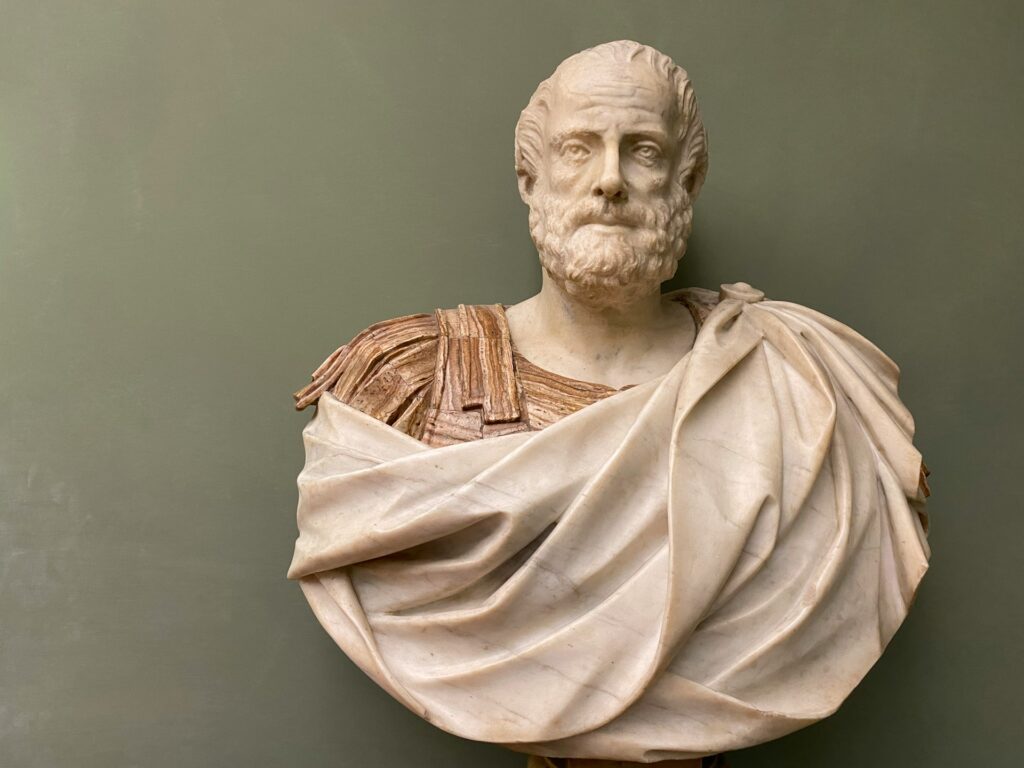Stoicism is more than just an ancient philosophy—it’s a practical guide to living a meaningful, resilient, and focused life. At its core, Stoicism teaches us how to manage our emotions, stay grounded amidst chaos, and lead with character. Founded in ancient Greece around the 3rd century BCE by Zeno of Citium, Stoicism has stood the test of time. But why? Because it speaks to something universal in us all—the desire to live with clarity, purpose, and strength in a world that often feels uncertain.
So, what exactly is Stoicism? In simple terms, it’s a philosophy that teaches you to distinguish between what you can control and what you cannot. It encourages you to focus your energy only on the former. That means less worrying about the opinions of others, unpredictable events, or even the weather—and more focus on your actions, your attitude, and your character.
In today’s fast-paced, high-stress world, these principles are more relevant than ever. Whether you’re facing a career setback, struggling in a relationship, or simply feeling overwhelmed, Stoicism offers a mental framework to help you navigate challenges with calm and confidence. It’s like having a mental toolkit for tough times—and who doesn’t need that?
Brief History and Key Figures
Stoicism was born in Athens but came of age in Rome. The early Stoics, like Zeno and Cleanthes, laid the foundation. But it was the Roman Stoics—Seneca, Epictetus, and the Roman Emperor Marcus Aurelius—who popularized the philosophy and made it timeless.
- Zeno of Citium started it all. After losing his fortune in a shipwreck, he stumbled upon Socratic teachings and began developing what would become Stoic philosophy.
- Seneca, a statesman and advisor to Nero, wrote eloquently about how to maintain one’s moral compass amid political corruption.
- Epictetus, once a slave, taught that freedom lies not in external circumstances but in inner mastery.
- Marcus Aurelius, perhaps the most famous Stoic, ruled the Roman Empire while privately reflecting on life’s challenges in his personal journal, now known as Meditations.
What’s remarkable is how their ideas—jotted down over 2,000 years ago—still resonate. They addressed stress, grief, anger, and ambition in ways that feel uncannily modern.
Core Principles of Stoic Philosophy

Virtue is the Highest Good
For the Stoics, virtue isn’t just a buzzword—it’s the foundation of everything. Virtue, in this context, means moral excellence: being honest, just, brave, and self-disciplined. Unlike modern society, which often equates happiness with wealth, fame, or success, the Stoics believed that true happiness can only come from living a virtuous life.
Think of virtue as your internal compass. No matter how wild the external world gets, your virtue keeps you on track. It’s about doing the right thing not because you expect rewards, but because it’s the right thing to do. And in the long run, living with integrity brings a deeper, more lasting satisfaction than any external accolade.
So the Stoic man doesn’t ask, “What will make me rich or popular?” He asks, “What is the right action here? What aligns with my values?” It’s a subtle but powerful shift in mindset—and it’s one that brings peace, even in turbulent times.
Dichotomy of Control
This is arguably the most powerful Stoic idea—and the most immediately useful. The Dichotomy of Control splits the world into two categories: things you can control and things you can’t. Your thoughts, actions, and responses? You control those. Other people’s opinions, the economy, traffic jams? Not so much.
Why is this important? Because we waste a lot of mental energy trying to control the uncontrollable. When you truly internalize this concept, you stop getting angry at traffic, frustrated by rude coworkers, or anxious about things that haven’t even happened yet.
Here’s the Stoic trick: focus fully on what you can control and accept what you can’t. It’s simple, but not easy. Still, with practice, this mindset creates immense psychological freedom. You become calmer, more resilient, and harder to knock off balance.
Living According to Nature
This doesn’t mean going off-grid or hugging trees—though those can be nice. In Stoic philosophy, “living according to nature” means aligning your life with reason, virtue, and the inherent order of the universe. It’s about living in harmony with your human nature—which is rational, social, and moral.
The Stoics believed we’re all part of a larger whole. When we live selfishly or irrationally, we’re fighting against that natural order. But when we act with integrity, think clearly, and contribute to society, we’re fulfilling our true purpose.
It’s a call to authenticity. To live not how others expect you to, but in a way that feels true to your deepest values. That’s powerful—and it’s something modern men can deeply relate to, especially in a world full of noise, distraction, and external pressure.
The Four Cardinal Virtues

Wisdom
Wisdom isn’t about knowing trivia or quoting philosophers—it’s about understanding what truly matters. For the Stoics, wisdom means making sound judgments, seeing the bigger picture, and choosing the best course of action in every situation.
A wise person knows that not all desires are worth chasing, not all fears are valid, and not all anger deserves attention. Wisdom helps you pause before reacting, question your assumptions, and see things as they truly are—not just how they feel in the moment.
In everyday life, wisdom shows up in your ability to manage conflict, make ethical decisions at work, or mentor a struggling friend. It’s the lens through which all other virtues are applied—and the cornerstone of Stoic living.
Courage
Life throws curveballs—setbacks, failures, heartbreaks. Stoicism doesn’t promise to shield you from them; it teaches you to face them with courage. Courage isn’t the absence of fear, but the choice to act rightly despite fear.
Whether it’s standing up for what you believe in, having a difficult conversation, or pushing through discomfort to grow, courage is essential. For Stoics, every challenge is an opportunity to exercise this virtue. And the more you practice, the stronger your inner resolve becomes.
Modern men often struggle with vulnerability, seeing it as weakness. But Stoicism reframes vulnerability as courage. To own your flaws, admit your fears, and still show up fully? That’s Stoic strength.
Temperance
Temperance is all about balance. In a world driven by excess—whether it’s food, drink, social media, or consumerism—Stoicism calls for moderation. It doesn’t mean you have to become an ascetic monk. Instead, temperance is about exercising self-control and knowing when enough is enough.
Think of it as your internal thermostat. Too much of anything—even a good thing—can throw you off. Stoics believed that real freedom comes not from indulging every impulse but from mastering them. You enjoy pleasures without being enslaved by them. You set boundaries, not because you’re rigid, but because you respect yourself and your goals.
Imagine eating just enough to feel nourished, speaking just enough to be heard, and spending just enough to stay comfortable. That’s temperance in action. It keeps your emotions steady and your life uncluttered.
Justice
Justice, in Stoic terms, isn’t just about laws or courtrooms. It’s about fairness, integrity, and treating others with dignity. It means doing your part in society, standing up for what’s right, and refusing to harm others—even when no one’s watching.
For the modern man, justice might look like speaking up against workplace discrimination, mentoring a young colleague, or being honest in a relationship. It’s about using your strength not for dominance, but for service.
The Stoics believed that we’re all interconnected. If you harm one person, you harm the collective. If you help one person, you lift the whole. Living justly gives your life a sense of purpose beyond personal gain—it aligns you with something bigger.
Stoicism in Daily Life

Morning Reflection and Evening Review
Stoicism isn’t just a philosophy to read about—it’s one to live. One of the most practical ways to do that is through daily reflection. The Stoics recommended starting and ending your day with intentional thought.
In the morning, ask yourself: What kind of person do I want to be today? What challenges might I face, and how can I respond with virtue? This mental rehearsal prepares you for the day ahead. It’s like putting on emotional armor—you step into the world ready to act with intention, not impulse.
At night, reflect on your actions: Did I act with courage? Did I lose my temper? Where could I improve? This isn’t about guilt-tripping yourself. It’s about learning, adjusting, and striving to do better tomorrow. Marcus Aurelius did this almost daily in his Meditations.
These bookends—morning preparation and evening review—create a feedback loop that builds emotional resilience and moral strength. It’s one of the simplest, yet most powerful Stoic practices you can adopt.
Practicing Negative Visualization
This one might sound odd at first—visualizing negative events? Isn’t that pessimistic? Actually, no. It’s one of the most empowering mental exercises in Stoicism. Called premeditatio malorum, or “premeditation of evils,” it involves imagining worst-case scenarios before they happen.
Why? Because when you confront your fears mentally, you rob them of their power. You reduce anxiety, build emotional readiness, and develop gratitude for what you currently have. Instead of taking things for granted, you learn to appreciate them more deeply.
Think about it: if you imagine losing your job, your health, or a loved one—not in a morbid way, but realistically—you gain perspective. You stop sweating the small stuff. You stop chasing trivial things. You become more present, more grounded.
Try it for a week. Each morning, think briefly about something that could go wrong. Then tell yourself: “If this happens, I will endure it with strength and grace.” It’s a mindset shift that prepares you for anything.
Journaling as a Stoic Tool
Writing is thinking made visible. And for Stoics, journaling wasn’t about documenting your day—it was about sharpening your mind. It’s where philosophy becomes personal.
Marcus Aurelius’ Meditations wasn’t written for publication. It was his private journal—a place to wrestle with doubts, track progress, and remind himself of Stoic principles. You can do the same.
Use your journal to:
- Reflect on your behavior
- Reaffirm your values
- Challenge your thoughts
- Plan virtuous actions
It doesn’t have to be lengthy. A few honest lines a day can clarify your thinking and reinforce your Stoic mindset. Over time, journaling becomes a mirror that shows not just where you’ve been—but who you’re becoming.
Modern Applications of Stoicism

Stoicism in the Workplace
The modern workplace is a battlefield of egos, deadlines, and unpredictable dynamics. It’s easy to get swept up in stress or office politics. That’s where Stoicism comes in like a secret weapon.
A Stoic professional focuses on what they can control: effort, attitude, and ethics. They don’t get flustered by gossip or distracted by praise. Instead, they do the work, stay level-headed, and lead by example.
Facing a tough client? Use the dichotomy of control. Can’t change their mood—but you can choose how you respond. Overwhelmed by projects? Apply temperance. Prioritize what matters most and let go of what doesn’t.
Even leadership becomes clearer with Stoicism. A Stoic boss doesn’t manage with fear or favoritism. They act with justice—making decisions based on fairness, not feelings. In short, Stoicism isn’t just helpful at work—it’s a blueprint for professional mastery.
Stoic Parenting
Parenting is one of the most emotionally demanding roles out there. You want the best for your kids, but the pressure to be perfect can become overwhelming. Enter Stoicism.
A Stoic parent leads with example—not control. They understand that they can’t shape every outcome, but they can shape their own behavior. They respond to tantrums with patience, set boundaries with love, and discipline with fairness.
One of the best gifts you can give your child is emotional stability. And that starts with you. Stoic parenting means staying calm during chaos, showing your child how to handle disappointment, and modeling virtues like courage, humility, and gratitude.
It’s not about being robotic. It’s about being real—and resilient. When kids see you living your values, they learn to do the same. That’s Stoic legacy in action.
Stoicism and Mental Health
In an era where anxiety and depression are at all-time highs, Stoicism offers a surprisingly modern approach to mental well-being. It’s not a replacement for therapy or medication, but it is a powerful supplement—a kind of philosophical therapy for the soul.
Stoicism teaches you to observe your thoughts without becoming enslaved by them. You learn to step back and say, “Is this thought useful? Is this fear rational?” That alone can reduce the grip of anxiety.
When you understand the Dichotomy of Control, you stop catastrophizing things outside your influence. You realize that your emotions don’t define you—your responses do. That shift alone can break cycles of negative thinking.
Also, Stoic practices like journaling, reflection, and visualization are incredibly grounding. They help you regain perspective, quiet the mental noise, and find peace in the present. For the modern man battling internal chaos, Stoicism is like mental armor—resilient, empowering, and quietly transformative.
Misconceptions About Stoicism

Stoics Are Emotionless
One of the biggest myths about Stoicism is that it’s about suppressing emotions. People often confuse Stoicism with being cold, detached, or robotic. But that couldn’t be further from the truth.
Stoicism doesn’t teach you to ignore your emotions—it teaches you to understand them. The goal isn’t to become numb; it’s to avoid being ruled by irrational feelings. You don’t suppress anger, for instance—you examine it, question it, and decide whether it serves you.
Marcus Aurelius had emotions. So did Seneca and Epictetus. The difference? They worked hard not to be dominated by their feelings. That’s emotional mastery, not emotional denial.
In fact, true Stoicism creates space for deeper joy, love, and connection—because your happiness is no longer fragile or dependent on external drama. You feel more because you control how you feel, not because you feel less.
Stoicism vs. Passivity
Another misunderstanding is that Stoicism is passive—that it teaches you to just accept everything and never fight back. But Stoicism is not about inaction. It’s about right action.
A Stoic doesn’t sit back when injustice happens. They take courageous, principled action—but they do it without anger or ego. They focus on what they can do, do it with integrity, and let go of the rest.
In other words, Stoicism isn’t a retreat from life—it’s full engagement with life, but on your own terms. You’re active, but not reactive. Bold, but not boastful. Grounded, but not indifferent.
Famous Stoic Quotes and Their Modern Relevance

Seneca, Marcus Aurelius, and Epictetus
The wisdom of the ancient Stoics has been passed down through powerful words—quotes that continue to inspire people today. Let’s look at a few timeless gems and how they apply to modern life.
- Seneca: “We suffer more often in imagination than in reality.”
- Ever stayed up all night worrying about something that never happened? That’s what Seneca was talking about. This quote reminds us that much of our stress comes not from life itself, but from the stories we tell ourselves.
- Marcus Aurelius: “You have power over your mind—not outside events. Realize this, and you will find strength.”
- In today’s chaotic world, where everything from traffic to politics can ruin your mood, this quote is like a compass. It pulls you back to what you can control—your mindset.
- Epictetus: “It’s not what happens to you, but how you react to it that matters.”
- This one’s gold for dealing with failure, criticism, or unexpected changes. Life throws curveballs. Your power lies in how you catch them—or let them pass.
These quotes aren’t just nice words—they’re blueprints for modern resilience. Tape them to your mirror. Make them your screensaver. Let them guide you.
How to Start Practicing Stoicism Today

Beginner Tips
Want to bring Stoicism into your life but not sure where to start? Don’t worry—you don’t need a toga or a scroll. Here are five practical steps to begin:
- Start Journaling – Each morning or night, write down your thoughts, goals, or reactions to challenges. Ask: Did I live with virtue today?
- Practice the Dichotomy of Control – Whenever you’re stressed, pause and ask: Is this within my control? If not, let it go.
- Read Stoic Texts – Start with Meditations by Marcus Aurelius or Letters from a Stoic by Seneca. They’re surprisingly relatable.
- Do a Daily Reflection – Begin your day by setting an intention. End it by reviewing how you lived up to your values.
- Use Negative Visualization – Imagine losing something you take for granted. Let it deepen your appreciation.
Start small. One idea, one habit, one shift in mindset. With consistent effort, Stoicism becomes more than a practice—it becomes part of who you are.
Books and Resources
Ready to dive deeper? Here’s a starter library for the modern Stoic:
- Meditations by Marcus Aurelius
- Letters from a Stoic by Seneca
- Discourses and Enchiridion by Epictetus
- The Obstacle Is the Way by Ryan Holiday
- How to Be a Stoic by Massimo Pigliucci
- A Guide to the Good Life by William B. Irvine
Also, check out podcasts like The Daily Stoic, and follow Stoic communities on Reddit or YouTube. The wisdom is out there—and the modern world is hungry for it.
Conclusion
In a world flooded with distractions, confusion, and emotional overload, Stoicism offers the calm in the storm. It’s not just ancient wisdom—it’s timeless wisdom. And it’s never been more relevant.
Stoicism isn’t about being perfect or emotionless. It’s about being intentional. Living with courage when you’re afraid. Speaking the truth when it’s hard. Acting with integrity when no one’s watching. Choosing virtue over vanity.
For the modern man, Stoicism is both shield and compass. It helps you protect your inner peace and navigate life’s chaos with strength, clarity, and honor.
Start small. Stay steady. And remember: you can’t control the world—but you can control you. And that’s where real power begins.
FAQs
Is Stoicism a religion?
No. Stoicism is a philosophy, not a religion. It doesn’t require belief in a deity or supernatural elements. It’s a practical system for living well, grounded in logic, ethics, and personal development.
Can Stoicism help with anxiety?
Yes. Stoicism teaches tools like the Dichotomy of Control and Negative Visualization that reduce anxiety by helping you focus on what you can control and let go of what you can’t.
Who are the most famous Stoic philosophers?
The most well-known Stoics are Marcus Aurelius, Seneca, Epictetus, and the founder, Zeno of Citium. Their writings have shaped the philosophy for over 2,000 years.
Is Stoicism still relevant today?
Absolutely. In today’s fast-paced, often chaotic world, Stoicism offers a grounded, rational, and empowering way to handle stress, setbacks, and relationships.
How do I apply Stoicism in relationships?
By practicing patience, empathy, and honesty. Stoicism teaches you to manage your emotions, listen deeply, and act in alignment with your values—even in difficult relationship dynamics.








